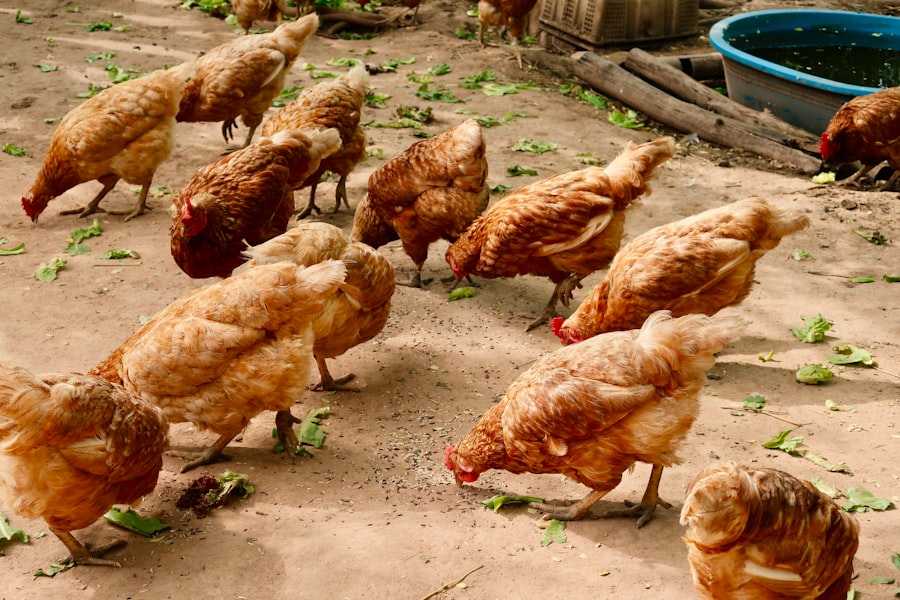Keeping chickens in Libertyville, IL can be a rewarding and fulfilling experience. However, it is important to understand and follow the laws and regulations set by the city to avoid penalties and conflicts with neighbors. In Libertyville, there are specific guidelines that must be followed when keeping chickens in residential areas.
According to the Libertyville Municipal Code, residents are allowed to keep up to six hens on their property, but roosters are not permitted. The chickens must be kept in a secure enclosure that is at least 25 feet away from any neighboring dwelling. Additionally, the enclosure must be kept clean and free from odors and pests.
It is important to familiarize yourself with these laws and regulations before starting your own backyard chicken flock. By doing so, you can ensure that you are in compliance with the rules and maintain a positive relationship with your neighbors.
Key Takeaways
- Understanding the laws on keeping chickens in Libertyville, IL is important before starting your own backyard flock.
- Keeping chickens in Libertyville, IL can provide benefits such as fresh eggs, natural pest control, and fertilizer for your garden.
- Choosing the right breed of chicken for your needs is crucial, as different breeds have different temperaments and egg-laying abilities.
- Preparing your backyard for chickens involves creating a safe and secure space for them to roam and providing them with food and water sources.
- When building a chicken coop, factors to consider include size, ventilation, and predator-proofing.
Benefits of Keeping Chickens in Libertyville, IL
There are numerous benefits to keeping chickens in Libertyville, IL. One of the main advantages is the health benefits of consuming fresh eggs and chicken meat. Eggs from backyard chickens are known to be higher in nutrients such as vitamins A, E, and D, as well as omega-3 fatty acids. Additionally, raising your own chickens allows you to have control over their diet and living conditions, ensuring that they are healthy and producing high-quality eggs.
Another benefit of keeping chickens is the cost savings on groceries. By having your own egg-laying hens, you can significantly reduce your grocery bill. Depending on the number of hens you have, you may even have enough eggs to share with friends and family.
Keeping chickens also provides educational opportunities for children. They can learn about responsibility, animal care, and where their food comes from. It can be a hands-on learning experience that teaches them about biology, sustainability, and the importance of caring for animals.
Lastly, keeping chickens promotes a sustainable and eco-friendly lifestyle. Chickens are natural recyclers, as they eat kitchen scraps and turn them into nutrient-rich compost. They also help control pests in the garden by eating insects and weeds. By keeping chickens, you are reducing waste, promoting sustainability, and living in harmony with nature.
Choosing the Right Breed of Chicken for Your Needs
When it comes to choosing the right breed of chicken for your needs in Libertyville, IL, there are several factors to consider. One important factor is the egg-laying capacity of the breed. If you are primarily interested in having a steady supply of fresh eggs, then you will want to choose a breed that is known for its high egg production. Some popular egg-laying breeds include Rhode Island Reds, Leghorns, and Australorps.
Another factor to consider is the temperament of the breed. Some breeds are known to be more docile and friendly, while others can be more skittish or aggressive. If you have children or plan on interacting with your chickens frequently, it is important to choose a breed that is known for being calm and friendly.
Climate adaptability is also an important consideration. Libertyville experiences cold winters, so it is important to choose a breed that can tolerate cold temperatures. Breeds such as Buff Orpingtons and Plymouth Rocks are known for their cold-hardiness.
Popular breeds for backyard chicken keeping in Libertyville, IL include Rhode Island Reds, Buff Orpingtons, Plymouth Rocks, Australorps, and Leghorns. These breeds are known for their egg-laying capacity, friendly temperament, and ability to adapt to various climates.
Preparing Your Backyard for Chickens
Before bringing chickens into your backyard in Libertyville, IL, it is important to make sure that the space is safe and suitable for them. One of the first considerations is predator-proofing. Chickens are vulnerable to predators such as raccoons, foxes, and hawks. It is important to secure the coop and run with sturdy fencing and wire mesh to prevent predators from gaining access.
In terms of space requirements, each chicken should have at least 4 square feet of coop space and 10 square feet of outdoor run space. This allows them to move around comfortably and engage in natural behaviors such as scratching and dust bathing.
Feeding and watering stations should also be set up in a convenient location. Chickens require a balanced diet that includes a mix of commercial feed, kitchen scraps, and fresh water. It is important to provide them with a constant supply of clean water and ensure that their feed is stored in a secure container to prevent rodents from accessing it.
Building a Chicken Coop: Factors to Consider
Building a chicken coop is an essential part of keeping chickens in Libertyville, IL. There are several factors to consider when designing and constructing a coop.
One important factor is the size of the coop. The coop should provide enough space for the number of chickens you plan on keeping. As mentioned earlier, each chicken should have at least 4 square feet of coop space. Additionally, the coop should have enough headroom for the chickens to stand up straight and stretch their wings.
The design of the coop is also important. It should be well-ventilated to prevent moisture buildup and allow for proper air circulation. The coop should also have windows or vents that can be opened and closed to regulate temperature and provide fresh air.
When it comes to materials, it is important to choose durable and weather-resistant materials that can withstand the elements. Common materials used for chicken coops include wood, metal, and plastic. It is also important to use non-toxic materials that are safe for the chickens.
The location of the coop in your backyard is another important consideration. It should be placed in an area that is well-drained and away from any standing water. The coop should also be situated in a spot that receives adequate sunlight and shade throughout the day.
Designing Your Chicken Coop: Tips and Ideas

Designing a chicken coop can be a fun and creative process. There are many ideas and tips to consider when designing a functional and aesthetically pleasing coop.
One idea is to incorporate windows or skylights into the design to allow for natural light. This not only provides a source of light for the chickens but also adds visual interest to the coop. Windows can also be opened and closed to regulate temperature and provide ventilation.
Another idea is to include nesting boxes for the chickens to lay their eggs. Nesting boxes should be dark, quiet, and comfortable to encourage the hens to lay their eggs in them. They should also be easily accessible for egg collection.
Incorporating eco-friendly features into the coop is another great idea. For example, you can install rain barrels to collect rainwater that can be used to water the garden or fill the chickens’ waterers. You can also use recycled materials such as pallets or reclaimed wood for construction.
Chicken Coop Plans: Where to Find Them
If you are not confident in your ability to design and build a chicken coop from scratch, there are many resources available for chicken coop plans. Online resources such as websites, blogs, and forums offer free and paid plans that you can download and use as a guide.
Local hardware stores and home improvement centers may also have chicken coop plans available for purchase. These plans often come with detailed instructions, material lists, and diagrams to make the building process easier.
When choosing a chicken coop plan, it is important to consider your specific needs and requirements. Make sure that the plan matches the size of your flock, the available space in your backyard, and your budget.
Building Your Own Chicken Coop: Step-by-Step Guide
If you are up for the challenge, building your own chicken coop can be a rewarding and fulfilling project. Here is a step-by-step guide to help you get started:
1. Determine the size and design of your coop based on the number of chickens you plan on keeping and the available space in your backyard.
2. Gather all the necessary materials and tools. This may include lumber, wire mesh, screws, nails, hinges, and roofing materials.
3. Start by building the frame of the coop. Use sturdy lumber to construct the walls, floor, and roof. Make sure to leave openings for windows, doors, and vents.
4. Install windows or vents for ventilation and natural light. These can be made from plexiglass or chicken wire.
5. Build nesting boxes for the chickens to lay their eggs. These should be dark, quiet, and easily accessible for egg collection.
6. Install roosting bars for the chickens to perch on at night. These should be placed higher than the nesting boxes.
7. Install a door for easy access to the coop. Make sure it is secure and can be locked to keep predators out.
8. Install wire mesh around the coop and run to prevent predators from gaining access.
9. Add bedding material such as straw or wood shavings to the floor of the coop.
10. Install feeders and waterers in a convenient location inside the coop.
11. Finally, add any finishing touches such as paint or stain to protect the wood from weathering.
Maintaining Your Chicken Coop: Best Practices
Once your chicken coop is built, it is important to establish a regular maintenance routine to keep it clean and in good condition.
Cleaning and sanitizing the coop is an important part of maintenance. Remove any soiled bedding material and replace it with fresh bedding. Scrub the coop with a mild detergent and water to remove any dirt or debris. Rinse thoroughly and allow the coop to dry before adding fresh bedding.
Regular health checks for your chickens are also important. Inspect them for any signs of illness or injury, such as lethargy, loss of appetite, or abnormal behavior. Check their feathers, eyes, beaks, and feet for any abnormalities. If you notice any issues, consult a veterinarian who specializes in poultry.
Winterizing the coop is essential to protect your chickens from the cold weather. Insulate the coop by adding extra bedding material and covering any drafts or openings. Provide a heat source such as a heat lamp or heated waterer to keep the chickens warm. Make sure to monitor the temperature inside the coop to ensure that it stays within a safe range.
Enjoying the Rewards of Raising Chickens in Libertyville, IL
Keeping chickens in Libertyville, IL can be a rewarding and fulfilling experience. By understanding and following the laws and regulations set by the city, you can enjoy the benefits of fresh eggs, cost savings on groceries, educational opportunities for children, and a sustainable lifestyle.
When choosing a breed of chicken, consider factors such as egg-laying capacity, temperament, and climate adaptability. Prepare your backyard by predator-proofing the area, providing adequate space for the chickens, and setting up feeding and watering stations.
Building a chicken coop requires careful consideration of size, design, materials, and location. Incorporate creative ideas and eco-friendly features into your coop design to make it functional and aesthetically pleasing.
Chicken coop plans can be found online or at local hardware stores and home improvement centers. If you choose to build your own coop, follow a step-by-step guide and maintain best practices for cleaning, health checks, and winterizing.
By following these guidelines and enjoying the rewards of raising chickens, you can have a thriving backyard flock and a sustainable lifestyle in Libertyville, IL.
If you’re considering keeping chickens in Libertyville, IL, you’ll want to make sure you have all the necessary information to provide them with a safe and comfortable environment. One important aspect to consider is the size of your chicken coop door. To learn more about the ideal dimensions for a chicken coop door, check out this informative article on poultrywizard.com. Additionally, if you’re looking for creative ways to enhance your chickens’ living space, you might be interested in exploring the concept of a chicken coop trampoline. Discover how this innovative idea can benefit your flock by visiting poultrywizard.com. And if you’re considering expanding your poultry collection beyond chickens, you may want to know when duck mating season occurs. Find out more about this topic on poultrywizard.com.
FAQs
What are the regulations for keeping chickens in Libertyville, IL?
According to the Libertyville Municipal Code, residents are allowed to keep up to six chickens on their property as long as they comply with certain regulations, such as keeping the chickens in a secure coop and run and maintaining cleanliness.
Do I need a permit to keep chickens in Libertyville, IL?
No, you do not need a permit to keep chickens in Libertyville, IL. However, you must comply with the regulations set forth in the Municipal Code.
What are the requirements for the chicken coop and run?
The chicken coop and run must be located in the rear yard of the property and must be at least 10 feet from any property line. The coop must be secure and provide at least 2 square feet of space per chicken, and the run must provide at least 8 square feet of space per chicken.
What are the rules for maintaining cleanliness?
The chicken coop and run must be kept clean and free of odors and pests. Manure must be removed regularly and stored in a covered container until it can be disposed of properly.
Are there any restrictions on roosters?
Yes, roosters are not allowed in Libertyville, IL. Only hens are permitted.
What should I do if my neighbors complain about my chickens?
If your neighbors complain about your chickens, you should try to address their concerns and make any necessary changes to comply with the regulations. If the issue cannot be resolved, you may need to seek mediation or legal assistance.
Meet Walter, the feathered-friend fanatic of Florida! Nestled in the sunshine state, Walter struts through life with his feathered companions, clucking his way to happiness. With a coop that’s fancier than a five-star hotel, he’s the Don Juan of the chicken world. When he’s not teaching his hens to do the cha-cha, you’ll find him in a heated debate with his prized rooster, Sir Clucks-a-Lot. Walter’s poultry passion is no yolk; he’s the sunny-side-up guy you never knew you needed in your flock of friends!







